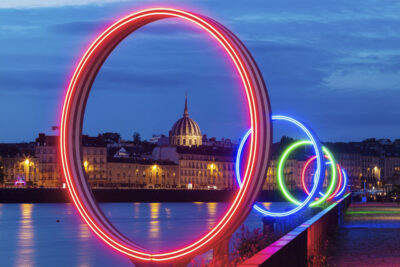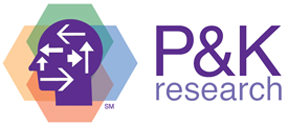
The Pangborn Sensory Science Symposium is a major conference in the field of sensory and consumer science, convening every two years at alternating locations in North America and Western Europe. This year, the conference took place in Nantes, France, from August 20th to 24th. Due to Covid-19, it has been four years since attendees had the opportunity to share their research findings and network in person. The diverse audience included over 1000 delegates from around the world, representing academia, industry, research institutes, research agencies, and consultancies.
Consistent with the conference’s history, the primary focus of the technical contributions centered on sensory characterization and consumer evaluation of food, beverage and non-food products. P&K Research proudly served as both a sponsor and exhibitor at the event, boasting the largest delegation among all U.S. research agencies, with nine attendees. The technical program featured 79 oral presentations, 8 workshops, and nearly 500 poster presentations, with P&K actively participating through oral, poster, and workshop formats.
A significant conference like Pangborn offers a valuable snapshot of the current state of research in sensory and consumer science, particularly within the food domain. The conference theme, “Meeting New Challenges in a Changing World,” aptly encapsulated the prevailing themes, emphasizing the research community’s pursuit of novel approaches and tools, as well as its commitment to addressing global challenges such as sustainability.
ResTech (Research Technology): Digitization of Sensory and Consumer Science
A hot topic at the conference was ResTech (Research Technology), highlighting the digitalization of sensory and consumer science. This area included presentations on digital devices for monitoring product usage, wearables for tracking biometrics, and evolved natural language processing tools for the analysis of text and social media data. Notably, two presentations explored the use of smart speaker technology, enabling study participants to respond to survey questions hands-free. These presentations indicated that, for closed-form (scaled) questions, there were no discernible differences in results between traditional post-use surveys and those administered through smart speakers. This aligns with findings from P&K’s research on smart speakers, which demonstrated slightly improved product discrimination but no significant differences in business implications. However, the potential value of smart speakers for collecting unstructured data, such as open-ended responses and think-aloud protocols, merits further exploration.
Another facet of ResTech was the use of virtual environments to introduce context into the setting of central location tests, bridging the gap between controlled testing environments and natural usage conditions. While past studies found similar product ratings in both conventional and virtual environments, recent results presented at the conference hinted at potential benefits of virtual reality for product assessments, underscoring the need for further research in this area.
Artificial Intelligence (AI) in Data Analysis
The conference also delved into the application of Artificial Intelligence models for data analysis. In collaboration with our research partner Aigora, we presented a comparison between traditional preference mapping approaches and those based on cutting-edge machine learning tools. Both approaches aim to connect sensory evaluations by trained panels with consumer reactions, a crucial link for guiding product innovation and development within the food and beverage industry. While the conclusions were largely similar, machine learning models exhibited advantages in cases requiring greater model flexibility. However, this increased flexibility necessitates higher resource investments due to the complexity of machine learning models. For more information, please contact Patti Wojnicz.
Advancements in Traditional Measurement Techniques
As customary for Pangborn, several contributions explored enhancements to traditional measurement techniques. Presentations explored ways to move “beyond liking” by investigating analytics to effectively link more abstract properties (e.g., “Nutritious,” “Sustainable”) with sensory terms. Collaborating with a client, we examined reaction time as an additional measure in preference tests, revealing a strong association between reaction time and the strength of preference, providing valuable behavioral insights to complement verbal liking responses.
Global Research and Cultural Differences
Global research took center stage, with several collaborations focused on studying variations in question formats to improve discrimination in countries where traditional question structures proved ineffective. The opening keynote of the conference shed light on differences in modes of thinking across the globe attributed to language and cultural disparities, emphasizing the need for global researchers and multicultural marketers to consider such distinctions carefully.
Sustainability in Focus
Sustainability emerged as a prominent theme at the conference, with 15 oral presentations and nearly 150 posters dedicated to sustainability in various forms, primarily centered around characterizing and accepting plant-based alternatives to meat and dairy products. For more insights, refer to our blog post on approaches to testing plant-based products.
Defining Sensory and Consumer Science
The conference concluded with a workshop on the last day, titled “What is sensory and consumer science? An evolving field still in need of a definition.” Notably, no definitive conclusions were reached, which seems fitting given the interdisciplinary nature of the field, drawing from disciplines such as cognitive science, food science, statistics, and data science. The question of whether a singular definition is possible or even necessary remains open, inviting comments and discussions, which can be directed to Richard Popper, one of the panelists involved in the workshop.
Pangborn 2023 provided valuable insights into the ever-evolving world of sensory and consumer science, showcasing advancements in technology, data analysis, and global perspectives, while highlighting the pressing issue of sustainability and the ongoing quest to define the field’s boundaries. We look forward to the next conference!
